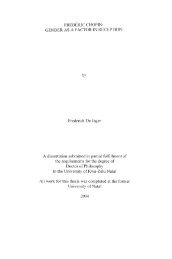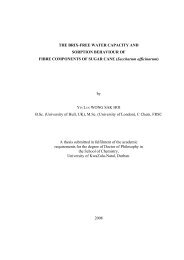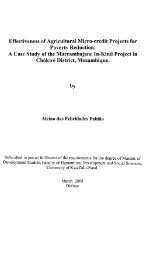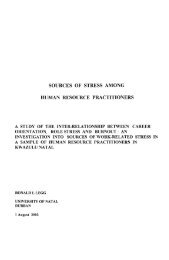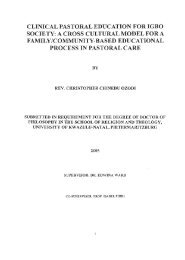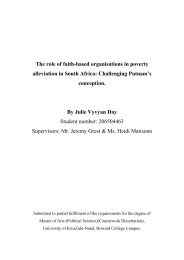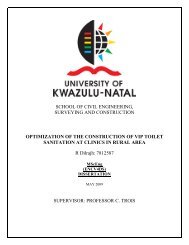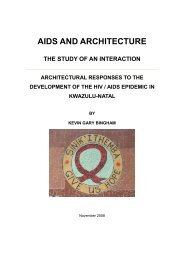View/Open - ResearchSpace - University of KwaZulu-Natal
View/Open - ResearchSpace - University of KwaZulu-Natal
View/Open - ResearchSpace - University of KwaZulu-Natal
You also want an ePaper? Increase the reach of your titles
YUMPU automatically turns print PDFs into web optimized ePapers that Google loves.
“Sometimes I ask for gloves from my friends who work for some organisations and also ask<br />
from the clinics from a person who is looking after the clinic. Sometimes they give us one<br />
pack but it is not enough. We also try to buy but we do not have funds to continue buying<br />
because one packet <strong>of</strong> gloves is expensive we can’t afford.” HBCC organisation B<br />
Due to lack <strong>of</strong> funds for purchasing materials for infection control practices, volunteer<br />
caregivers had to reuse the aprons and gloves or use plastics in place <strong>of</strong> gloves. This caused<br />
them to fear contagion, feel frustrated and demoralised. This is presented in the following<br />
statements:<br />
“When we do not have gloves they must use empty plastics for bread in place <strong>of</strong> gloves so<br />
that it can play the role that gloves play because there is no other way it is really frustrating<br />
to these carers.” (HBCC, organisation A)<br />
“…We take those used gloves, wash and re-use them. These aprons we just use the other side,<br />
but we are supposed to use them once and get new ones. Now that we re-use them…it’s a big<br />
problem it is risky and it’s not right!” (Focus Group 7, organisation G)<br />
Furthermore, some volunteer caregivers mentioned that they did not perform their physical<br />
duties without materials due to fear <strong>of</strong> contagion by the patients as such, they only focused on<br />
providing counselling and in some instances they would not visit any patients. This is evident<br />
in the following response:<br />
“We tell them that we are not going to help them because we have run out <strong>of</strong> stock <strong>of</strong><br />
materials and we are not abandoning you but there is nothing we can do. Sometimes we don’t<br />
even go there.” Focus Group 4, organisation D)<br />
4.6.3 Poor quality materials<br />
Most participants in focus group discussions were unhappy and complained about poor<br />
quality materials (such as gloves, masks and aprons) that they received. They feared<br />
contagion and they could not perform their work effectively and efficiently. They made the<br />
following statements:<br />
“When we bath people...the gloves they give us here...our hands are not the same, like mine<br />
they are small, others have bigger hands. When you wear gloves and you've only washed the<br />
face <strong>of</strong> the patient, you only discover that they are torn and there is water inside the glove.<br />
Sometimes they are tight here on the wrist, some they have small holes, some they are loose<br />
and they easily break! They are just too short for this kind <strong>of</strong> work that we do!”<br />
(Focus group 5, organisation E)<br />
51



